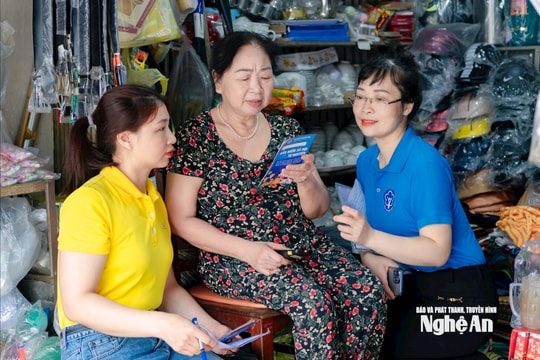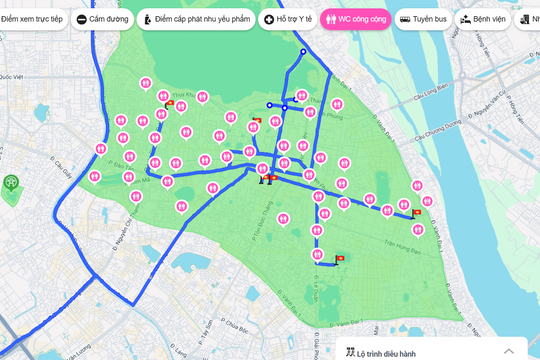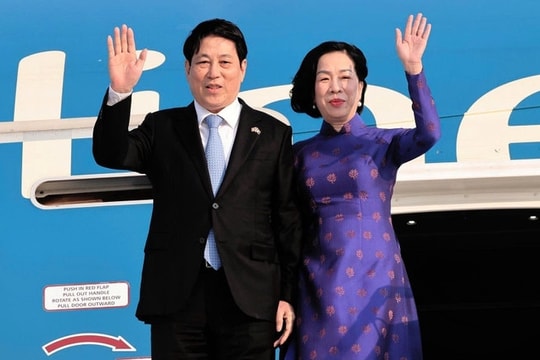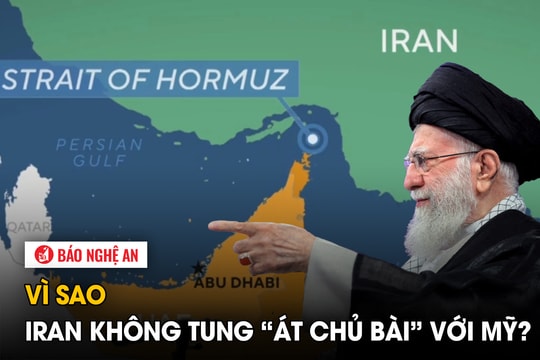A series of important new policies take effect from January 2018
Many new or amended laws take effect from January 1, 2018; increasing regional minimum wages; applying preferential import and export tax schedules; amending regulations on land use fee collection; new regulations on calculating deposit interest between credit institutions and customers... are new policies that take effect from January 2018.
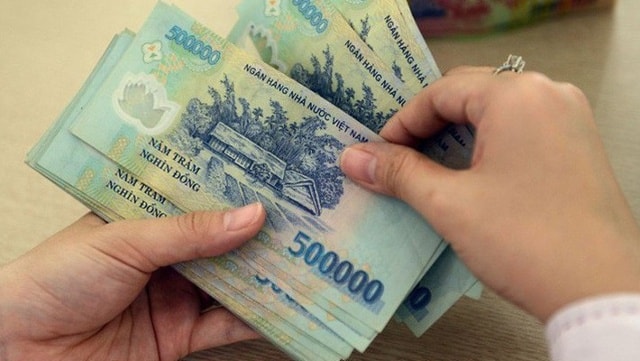 |
| With the new wage policy, the new regional minimum wage is about 180,000 - 230,000 VND/month higher than the old wage. |
10 laws take effect from January 1
From January 1, 2018, 10 laws will come into effect, including: Law amending and supplementing a number of articles of the Penal Code No. 100/2015/QH13; Criminal Procedure Code; Law on Temporary Detention and Temporary Imprisonment; Law on Organization of Criminal Investigation Agencies; Law on Legal Aid; Law on Beliefs and Religions; Law on Support for Small and Medium Enterprises; Law on Foreign Trade Management; Law on Management and Use of Public Assets and Law on Tourism.
Regional minimum wage increase from January 1
According to Decree No. 141/2017/ND-CP dated December 7, 2017, the regional minimum wage applicable to employees working in enterprises from January 1, 2018 is as follows: Region: VND 3,980,000/month; Region 2: VND 3,530,000/month; Region 3: VND 3,090,000/month; Region 4: VND 2,760,000/month.
Thus, the new regional minimum wage is about 180,000 - 230,000 VND/month higher than the old wage.
The area applying the regional minimum wage is regulated according to administrative units at district, town and provincial city levels.
The Decree clearly states that enterprises operating in a specific area shall apply the regional minimum wage prescribed for that area. In case an enterprise has units or branches operating in areas with different regional minimum wages, the unit or branch operating in the specific area shall apply the regional minimum wage prescribed for that area.
Enterprises operating in industrial parks and export processing zones located in areas with different regional minimum wages shall apply the area with the highest regional minimum wage.
Amendment of regulations on land use fee collection
Effective from January 1, 2018, Decree No. 123/2017/ND-CP dated November 14, 2017 amends and supplements a number of articles of the Decrees regulating the collection of land use fees, land rent, and water surface rent.
Specifically, this Decree amends and supplements a number of articles of Decree No. 45/2014/ND-CP dated May 15, 2014 regulating the collection of land use fees and Decree No. 46/2014/ND-CP dated May 15, 2014 regulating the collection of land and water surface rents.
One of the notable contents of the decree is that households and individuals who change the land use purpose from non-agricultural production and business land but originally residential land to residential land of households and individuals do not have to pay land use fees.
Apply preferential import and export tax schedule
Decree 125/2017/ND-CP dated November 16, 2017 amending and supplementing a number of articles of Decree 122/2016/ND-CP dated September 1, 2016 of the Government on export tariff schedules, preferential import tariff schedules, list of goods and absolute tax rates, mixed tax, import tax outside tariff quotas effective from January 1, 2018.
In particular, issued together with this Decree are appendices on export tax schedules according to the list of taxable goods; Preferential import tax schedules according to the list of taxable goods; List of goods and absolute tax rates, mixed tax rates for used passenger cars with 15 seats or less (including the driver); List of goods and import tax rates outside the tariff quota for goods subject to tariff quotas.
Policy to attract and create human resources
Decree No. 140/2017/ND-CP dated December 5, 2017 on policies to attract and create human resources from excellent graduates and young scientists takes effect from January 20, 2018.
The Decree specifies each subject and criteria for applying policies to attract and create sources of cadres. Specifically, excellent university graduates from domestic or foreign higher education institutions are recognized as equivalent to degrees and certificates according to the provisions of law, have excellent academic and training results in the years of university study, are within the age range specified in Article 1 of the Youth Law as of the time of application and meet one of the criteria from third prize or higher in provincial and national excellent student competitions, science and technology competitions, Olympics, etc.
For those with a master's degree, a first-level specialist doctor, a resident doctor, or a first-level specialist pharmacist specializing in medicine or pharmacy within the age range specified in Article 1 of the Youth Law at the time of application submission and meeting the specific criteria specified in the Decree.
Converting state-owned enterprises into joint stock companies
Decree 126/2017/ND-CP dated November 16, 2017 on converting state-owned enterprises and single-member limited liability companies with 100% charter capital invested by state-owned enterprises into joint stock companies takes effect from January 1, 2018.
According to the new regulations, enterprises including: state-owned enterprises and single-member limited liability companies with 100% charter capital invested by state-owned enterprises shall be equitized when they meet two conditions: Not being in the category of enterprises in which the State needs to hold 100% of charter capital. The list of enterprises in which the State holds 100% of charter capital is decided by the Prime Minister in each period; the remaining state capital after financial settlement and re-evaluation of enterprise value.
Decree No. 126/2017 clearly stipulates that the State shall not provide additional capital for equitization, including enterprises according to the Prime Minister's regulations on promulgating criteria, lists, and classifications of state-owned enterprises when implementing equitization in which the State holds more than 50% of total shares.
The Decree also stipulates three forms of equitization, including: Maintaining the existing state capital at the enterprise and issuing additional shares to increase charter capital; selling a part of the existing state capital at the enterprise or combining the sale of a part of the state capital and issuing additional shares to increase charter capital; selling all of the existing state capital at the enterprise or combining the sale of all of the state capital and issuing additional shares to increase charter capital.
Regulations on foreign investment in oil and gas
According to Decree No. 124/2017/ND-CP dated November 15, 2017 regulating foreign investment in petroleum activities effective from January 1, 2018, to prepare for investment or implement petroleum projects abroad, investors are allowed to establish or participate in establishing an operating company in Vietnam, in the country receiving the investment or in a third country in accordance with relevant laws, petroleum contracts and generally accepted international petroleum industry practices.
In case the investor decides to establish an operating company for the purpose of participating in or implementing an overseas petroleum project on behalf of the investor, the operating company will be named in the overseas investment registration certificate. The operating company is allowed to use the overseas investment registration certificate to serve the activities related to the implementation of the petroleum project.
The investor is responsible for implementing the project in accordance with the foreign investment registration certificate and relevant legal provisions.
The Decree also stipulates that investors contribute investment capital in the following forms: Capital contribution in the form of capital calling by the project operator; Capital contribution to a joint operating joint venture company, operating company; Purchase of shares of a company that owns part or all of the oil and gas project; Capital contribution in the form of lending capital to the operating company; Other forms as prescribed by the law of the country receiving the investment or decided by the Prime Minister.
Special mechanism for lottery businesses
Decree 122/2017/ND-CP dated November 13, 2017 stipulates a number of specific contents on financial management mechanism and performance evaluation for lottery businesses. Accordingly, the decree stipulates that lottery businesses are only allowed to invest outside in industries directly related to lottery business activities.
Regarding the revenue of lottery businesses, the decree stipulates the following items: Revenue from business activities of permitted lottery types, revenue from other business activities, revenue from financial activities as prescribed by law and other income.
For the cumulative prizes of computerized lottery products, if the prize-claiming period expires and the winner does not come to claim the prize, the lottery business enterprise is allowed to operate computerized lottery and account it as other income of the enterprise.
Lottery businesses are allowed to deduct certain specific expenses when calculating corporate income tax, such as: Prize payment expenses; agent commissions for lottery agents; authorization expenses for prize payment to winning customers, etc.
Administrative violations in construction can be fined up to 1 billion VND
Effective from January 15, 2018, Decree 139/2017/ND-CP dated November 27, 2017 stipulates sanctions for administrative violations in construction investment activities; exploitation, processing, and trading of minerals as construction materials, production and trading of construction materials; management of technical infrastructure works; real estate business, housing development, management of house and office use.
Accordingly, the maximum fine in the field of construction investment activities is 1 billion VND; in the field of mining, processing, and trading of minerals for construction materials, production and trading of construction materials; management of technical infrastructure works; real estate business, housing development, management of house and office use is 300 million VND.
The fines prescribed in this Decree are applicable to organizations (except in some cases). For the same administrative violation, the fine for an individual is half the fine for an organization.
New regulations on calculating interest on deposits with customers
From January 1, 2018, the method of calculating interest in deposit receiving and credit granting activities between credit institutions and customers is implemented according to the provisions of Circular 14/2017/TT-NHNN issued by the State Bank.
The highlight of this new circular is the regulation on interest calculation. Accordingly, the interest rate is converted to the annual interest rate, a year is defined as 365 days.
In the past, the above interest calculation method was implemented according to Decision No. 652/2001/QD-NHNN since 2001, there were problems, as well as changes in newly issued legal documents. In particular, the main problem is that the regulation on the number of days in a year in Decision 652 is not consistent with the current Civil Code and the actual number of days in a year.
In addition, the new circular also stipulates that credit institutions may agree with customers to determine the interest calculation period according to one of two methods: the method of excluding the first day and calculating the last day of the interest calculation period (as prescribed in Articles 147 and 148 of the Civil Code) or the method of calculating the first day and excluding the last day of the interest calculation period.
Credit institutions and customers may agree on interest rates and interest calculation methods in accordance with the provisions of law on receiving deposits, granting credit and the provisions of this Circular.
In addition, a number of new regulations and policies on the amount of money that commercial legal entities must pay to ensure execution of judgments; Management of the database on temporary detention and temporary imprisonment; Principles for sealing and unsealing evidence; Regulations on reporting regime on criminal investigations; Organization and operation of State Legal Aid Centers... will also take effect from January 2018.
According to VOV
| RELATED NEWS |
|---|


